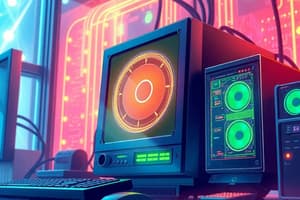Podcast
Questions and Answers
Which hardware component is responsible for performing the basic operations of a computer system?
Which hardware component is responsible for performing the basic operations of a computer system?
- Motherboard
- Central Processing Unit (CPU) (correct)
- Graphics Processing Unit (GPU)
- Power Supply
What type of hardware are monitors, keyboards, and printers classified as?
What type of hardware are monitors, keyboards, and printers classified as?
- Storage devices
- Hardware peripherals (correct)
- Hardware components
- Embedded hardware
Which hardware component is responsible for providing electrical power to the computer components?
Which hardware component is responsible for providing electrical power to the computer components?
- Power Supply (correct)
- Central Processing Unit (CPU)
- Cooling System
- Storage device
What is the primary function of network hardware?
What is the primary function of network hardware?
Which hardware subtopic focuses on components like embedded systems and microcontrollers?
Which hardware subtopic focuses on components like embedded systems and microcontrollers?
Which hardware component is essential for converting digital data into visual images on a computer screen?
Which hardware component is essential for converting digital data into visual images on a computer screen?
What type of computer systems are integrated into other devices to provide specific functionality?
What type of computer systems are integrated into other devices to provide specific functionality?
Which device is responsible for routing data between devices in a computer network?
Which device is responsible for routing data between devices in a computer network?
What type of systems are designed for specialized applications and not intended for general-purpose computing?
What type of systems are designed for specialized applications and not intended for general-purpose computing?
Which interface can be used to connect peripherals to a computer wirelessly?
Which interface can be used to connect peripherals to a computer wirelessly?
Which hardware devices are used to establish and maintain computer networks?
Which hardware devices are used to establish and maintain computer networks?
What is responsible for managing network traffic and ensuring the security of the network?
What is responsible for managing network traffic and ensuring the security of the network?
Flashcards are hidden until you start studying
Study Notes
Hardware: A Comprehensive Guide
Hardware refers to the physical components of a computer system or other electronic devices. It encompasses a wide range of subtopics, including computer hardware, hardware components, hardware peripherals, embedded hardware, and network hardware. In this article, we will delve into each of these subtopics, providing a detailed and factual overview of the various aspects of hardware.
Computer Hardware
Computer hardware refers to the physical components of a computer system. These include the Central Processing Unit (CPU), Memory, Storage, Input/Output (I/O) devices, and other peripherals. Computer hardware is responsible for performing the basic operations of a computer, such as processing data, storing information, and interacting with the user through input and output devices.
Hardware Components
Hardware components are the physical parts of a computer or electronic device. These include the CPU, Memory, Storage, Power Supply, Motherboard, Graphics Processing Unit (GPU), and Cooling System. Each component plays a specific role in the functioning of the computer, and their performance and compatibility are crucial for optimal system operation.
Hardware Peripherals
Hardware peripherals are external devices that connect to a computer or other electronic devices to enhance their functionality. These include monitors, keyboards, mice, printers, scanners, and speakers. Peripherals can be connected to a computer through various interfaces, such as USB, Bluetooth, Wi-Fi, or Ethernet, depending on the specific device and the capabilities of the computer.
Embedded Hardware
Embedded hardware refers to computer systems that are integrated into other devices to provide specific functionality. These systems are typically designed for specialized applications and are not intended for general-purpose computing. Examples of embedded hardware include digital signage, industrial control systems, and automotive electronics.
Network Hardware
Network hardware refers to the devices that are used to establish and maintain computer networks. These devices include routers, switches, hubs, and modems. Network hardware is responsible for routing data between devices, managing network traffic, and ensuring the security and reliability of the network.
In conclusion, hardware is a critical aspect of any computer or electronic device. Understanding the various subtopics of hardware, such as computer hardware, hardware components, hardware peripherals, embedded hardware, and network hardware, is essential for ensuring optimal system performance and functionality.
Studying That Suits You
Use AI to generate personalized quizzes and flashcards to suit your learning preferences.




